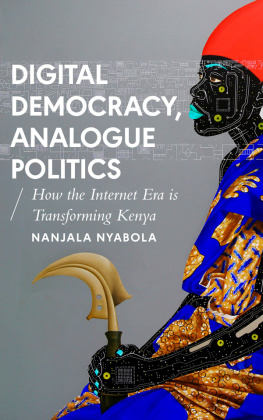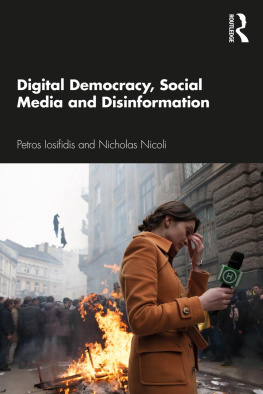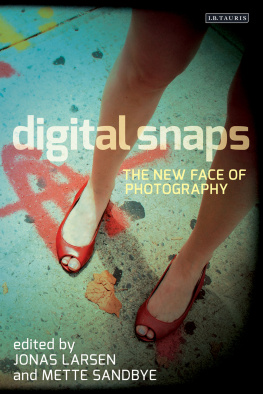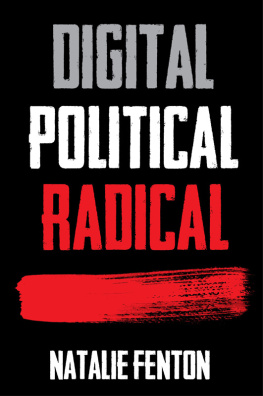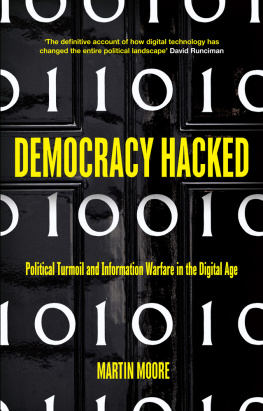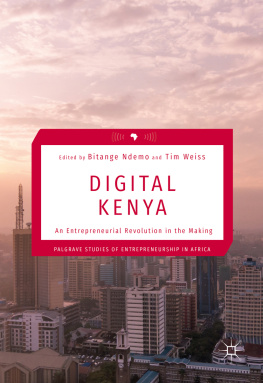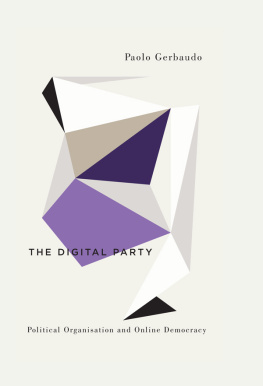
African Arguments
Written by experts with an unrivalled knowledge of the continent, African Arguments is a series of concise, engaging books that address the key issues currently facing Africa. Topical and thought-provoking, accessible but in-depth, they provide essential reading for anyone interested in getting to the heart of both why contemporary Africa is the way it is and how it is changing.
African Arguments Online
African Arguments Online is a pan-African platform for news, investigation and opinion, managed by the Royal African Society, www.africanarguments.org
Series editors
Adam Branch, University of Cambridge
Alex de Waal, World Peace Foundation
Richard Dowden, journalist and author
Alcinda Honwana, Open University
Managing editor
Stephanie Kitchen, International African Institute
Editorial board
Emmanuel Akyeampong, Harvard University
Tim Allen, London School of Economics and Political Science
Akwe Amosu, Open Society Institute
Breyten Breytenbach, Gore Institute
Peter da Costa, journalist and development specialist
William Gumede, journalist and author
Abdul Mohammed, InterAfrica Group
Robert Molteno, editor and publisher
Titles already published
Alex de Waal, AIDS and Power
Tim Allen, Trial Justice
Raymond W. Copson, The United States in Africa
Chris Alden, China in Africa
Tom Porteous, Britain in Africa
Julie Flint and Alex de Waal, Darfur: A New History of a Long War
Jonathan Glennie, The Trouble with Aid
Peter Uvin, Life after Violence: A Peoples Story of Burundi
Bronwen Manby, Struggles for Citizenship in Africa
Camilla Toulmin, Climate Change in Africa
Orla Ryan, Chocolate Nations
Theodore Trefon, Congo Masquerade
Lonce Ndikumana and James Boyce, Africas Odious Debts
Mary Harper, Getting Somalia Wrong?
Neil Carrier and Gernot Klantschnig, Africa and the War on Drugs
Alcinda Honwana, Youth and Revolution in Tunisia
Marc Epprecht, Sexuality and Social Justice in Africa
Lorenzo Cotula, The Great African Land Grab?
Michael Deibert, The Democratic Republic of Congo
Adam Branch and Zachariah Mampilly, Africa Uprising
Celeste Hicks, Africas New Oil
Morten Jerven, Africa: Why Economists Get it Wrong
Theodore Trefon, Congos Environmental Paradox
Paul Richards, Ebola: How a Peoples Science Helped End an Epidemic
Louisa Lombard, State of Rebellion
Kris Berwouts, Congos Violent Peace
Hilary Matfess, Women and the War on Boko Haram
Celeste Hicks, The Trial of Hissne Habr
Mick Moore, Wilson Prichard and Odd-Helge Fjeldstad, Taxing Africa
Ebenezer Obadare, Pentecostal Republic
Forthcoming title
Rachel Ibreck with Alex de Waal, South Sudans Injustice System: Law and Activism on th e Front Line
Published by Zed Books and the IAI with the support of the following organisations:
The principal aim of the International African Institute is to promote scholarly understanding of Africa, notably its changing societies, cultures and languages. Founded in 1926 and based in London, it supports a range of seminars and publications including the journal Africa .
www.internationalafricaninstitute.org
The Royal African Society is a membership organisation that provides opportunities for people to connect, celebrate and engage critically with a wide range of topics and ideas about Africa today. Through events, publications and digital channels it shares insight, instigates debate and facilitates mutual understanding between the UK and Africa. The society amplifies African voices and interests in academia, business, politics, the arts and education, reaching a network of more than one million people globally.
www.royalafricansociety.org
The World Peace Foundation , founded in 1910 , is located at the Fletcher School, Tufts University. The Foundations mission is to promote innovative research and teaching, believing that these are critical to the challenges of making peace around the world, and should go hand in hand with advocacy and practical engagement with the toughest issues. Its central theme is reinventing peace for the twenty-first century.
www.worldpeacefoundation.org
About the author
Nanjala Nyabola is a Kenyan writer, humanitarian advocate and political analyst currently based in Nairobi, Kenya. Her writing and research focus on refugee issues and humanitarian interventions, as well as technology and media in Africa. She is the co-editor of Where Women Are: Gender and the 2017 Kenyan Election and a frequent contributor to numerous publications and platforms including Al Jazeera, Foreign Policy, Foreign Affairs, IRIN, New African, The Africa Report and the BBCs Focus on Africa, as well as numerous books. Nyabola holds a BA in African Studies and Political Science from the University of Birmingham (UK), an MSc in Forced Migration and an MSc in African Studies, both from the University of Oxford, where she studied as a Rhodes Scholar, as well as a J.D. from Harvard Law School.
DIGITAL DEMOCRACY, ANALOGUE POLITICS
HOW THE INTERNET ERA IS
TRANSFORMING KENYA
NANJALA NYABOLA

Digital Democracy, Analogue Politics: How the Internet Era is Transforming Kenya was first published in 2018 by Zed Books Ltd, The Foundry, 17 Oval Way, London SE11 5RR, UK
www.zedbooks.net
Copyright Nanjala Nyabola 2018
The right of Nanjala Nyabola to be identified as the author of this work have been asserted by her in accordance with the Copyright, Designs and Patents Act, 1988
Typeset in Haarlemmer by seagulls.net
Index: Ed Emery
Cover design: Jonathan Pelham
Cover image credit:
Eddy Kamuanga Ilunga, Reconnaissance II, 2016
Acrylic and oil on canvas
Courtesy of October Gallery
James Zang collection
All rights reserved. No part of this publication may be reproduced, stored in a retrieval system or transmitted in any form or by any means, electronic, mechanical, photocopying or otherwise, without the prior permission of Zed Books Ltd.
A catalogue record for this book is available from the British Library
ISBN 978-1-78699-430-1 hb
ISBN 978-1-78699-431-8 pb
ISBN 978-1-78699-432-5 pdf
ISBN 978-1-78699-433-2 epub
ISBN 978-1-78699-434-9 mobi
For my family, who dont always understand but support me anyway.
CONTENTS
This book has been over ten years in the making, beginning with my experiences of the 2007 election violence in Kenya and my own frustrating interactions with the Western canon on Africa that discouraged me from pursuing this subject while at university. Ten years since that crisis, Im ecstatic to finally be able to put these thoughts into the world, and glad to see that my instincts were right technology is indeed playing a disproportionate role in shaping Kenyan politics.
It takes a village to complete a project of this depth and breadth, and I am especially grateful to my little e-village that has believed in me and in this project. I would especially like to thank Dr Keguro Macharia, who is more of a mentor to me than he realises and constantly pushes me to be a more generous, questioning and engaged thinker. To the radical feminists of Kenyan Twitter Ory Okolloh Mwangi, Aisha Ali, Kellie Murungi, Nanjira Sambuli, Dr Wambui Mwangi, Dr Wandia Njoya, Dr Njoki Ngumi, Dr Grace Musila and countless others whose daily conversations are filled with wit and wisdom that every day reifies my belief in our broken little country. You are ungovernable, and Kenya needs more of you. And to Dr Yolande Bouka, Dr Malebogo Ngoepe, Jina Moore and Katrin Siedel, who listened.
Next page
